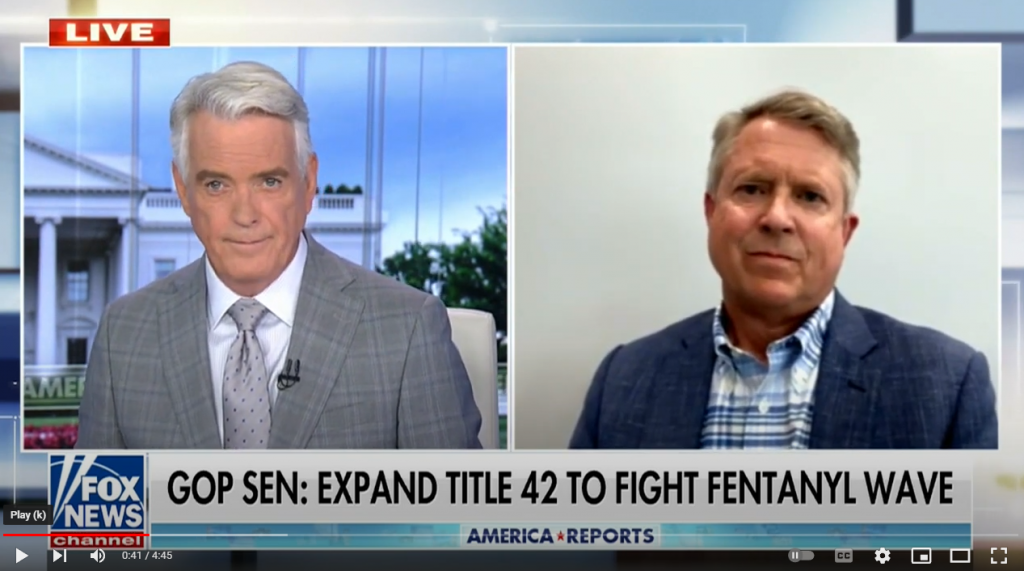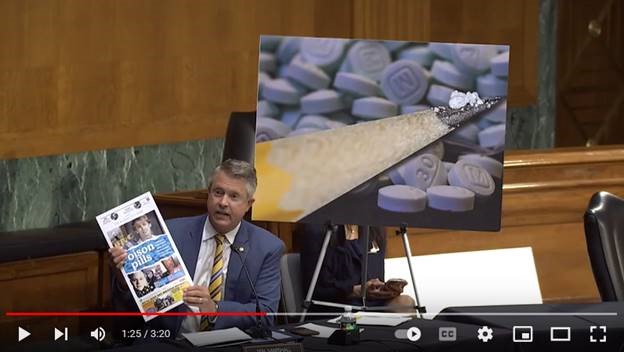- June 17, 2022
VIDEO: Sen. Marshall Discusses Fentanyl Crisis on FOX News
(Washington, D.C., June 17, 2022) – U.S. Senator Roger Marshall, M.D. was on FOX News today to discuss the fentanyl crisis that is wreaking havoc in Kansas and across the nation. The interview comes just a day after Senator Marshall questioned CDC Director Rochelle Walensky at a hearing about the illicit fentanyl crisis and pressed her on the need to expand pandemic-related Title 42 expedited removal authority to combat the fentanyl overdose epidemic resulting from drug smuggling across our southern border. You may click HERE or on the image below to watch Senator Marshall’s FOX News interview.

While you may click HERE or on the image below to watch yesterday’s hearing with CDC Director Walensky, Senator Marshall said in part,
“Thanks to our inhumane open border policies every state is now a border state. In my home state of Kansas, a person dies most every day from fentanyl poisoning… This is now an epidemic. Just last week, in Kansas City, authorities seized 15,000 counterfeit pills containing fentanyl in a two-day bust… Fentanyl precursors are made in China, then the Chinese work with cartels to process into lethal fentanyl, often lacing other opioids, marijuana, Adderall, Xanax, among others… Unfortunately, one pill can kill. And, in the case of one young student in Shawnee, Kansas, it only took half of a fake Percocet pill laced with a lethal dose of fentanyl to kill him…”

Senator Marshall asked Dr. Walensky the following questions:
- Would you commit to expanding Title 42 authority to turn back migrants to combat prolific drug smuggling across the U.S.-Mexico border in an effort to stop the flow of fentanyl that is killing Americans every day?
- Fentanyl awareness groups have asked the Biden administration to track poisoning and overdose deaths similar to COVID-19 deaths. Considering this is killing more individuals aged 18-45 than COVID-19 do you believe this would be beneficial to the fight against this scourge on our communities?
Those in need of assistance can visit www.FindTreatment.gov.
Background:
Yesterday, Senator Marshall announced support for the Stop Fentanyl Border Crossings Act, legislation to expand pandemic-related Title 42 expedited removal authority to combat the fentanyl overdose epidemic resulting from drug smuggling across our southern border.
Recently, on National Fentanyl Awareness Day, Senator Marshall announced support for the HALT Fentanyl Act. The legislation would permanently give law enforcement the tools to help combat the fentanyl crisis by permanently placing fentanyl-related substances as a class into Schedule I of the Controlled Substances Act. A Schedule I controlled substance is a drug, substance, or chemical that has a high potential for abuse; has no currently accepted medical value; and is subject to regulatory controls and administrative, civil, and criminal penalties under the Controlled Substances Act. Fentanyl-related substances’ current Schedule I classification is temporary and set to expire later this year.
Last month, Senator Marshall and Kansas Sheriffs Calvin Hayden (Johnson County), Brian Hill (Shawnee County), Roger Soldan (Saline County), Jeff Richards (Franklin County), and Tim Morse (Jackson County) traveled to the Southern Border for briefings, tours, and meetings with border patrol officials, within DHS and the state of Texas. The trip came amid the pending expiration of Title 42 and the growing fentanyl crisis that is wreaking havoc in Kansas and across the nation. You may click HERE or on the image below to watch a recap visit of their trip.

You may click HERE or on the collage below to download high-res photos from their trip.

Senator Marshall is a cosponsor of the Senate resolution to designate today, May 10, 2022 as National Fentanyl Awareness Day. The resolution supports the mission and goals of National Fentanyl Awareness Day in 2022, including increasing individual and public awareness of the impact of fake or counterfeit fentanyl-related substances on families and young people.
- Fentanyl is a synthetic opioid that is 80-100 times stronger than morphine.
- Kansas suffered a 54% increase in drug overdoses during the first six months of 2021 compared to the same period in 2020.
- Of the 338 people in Kansas who died of drug overdose between Jan. 1 and June 30 of last year – 149 involved fentanyl or fentanyl analogs.
- Overdose deaths from fentanyl-related substances topped all other drug-related overdose deaths in Kansas in 2021
- In the first three months of 2022, Kansas saw more than 2,500 drug overdoses.
- While not on the Kansas side, the Kansas City Police Department announced that accidental overdoses from fentanyl-related substances had climbed nearly 150% from 2019 to 2020 in the metro area, particularly noticeable among ages 15 to 24. Last year, out of 129 overdoses, 50 were fentanyl-related.
- In May, Kansas City, Kansas officers seized nearly 15,000 counterfeit pills laced with fentanyl during a two-day bust,
- In March, Wichita officers seized 7,000 fentanyl-related substance pills during a traffic stop.
- The Wichita Police Department also said that they recently worked five suspected overdose cases in a 24-hour period – two of those were juveniles.
- Nationwide, four in 10 pills examined by DEA labs contain a deadly amount of fentanyl-related substance, an amount that can fit on the tip of a pencil.
- Since Joe Biden took office, nearly 14,000 pounds of fentanyl have been seized from criminals at the southern border – and a record 1,300 pounds were discovered just this past April – much more made it over the border undetected.
- 15,000lbs of fentanyl-related substances were seized in 2021 – enough to supply a potentially lethal dose to every member of the U.S. population.
- 64% of overdose deaths in the U.S. involved synthetic opioids, primarily fentanyl-related substances.
- 4 out of 10 DEA-tested fake pills with fentanyl-related substances contain a potentially deadly dose.
- 12 month period ending in October 2021: 105,000 overdose deaths – 66% were due to fentanyl-related substances, synthetic opioids.
###
